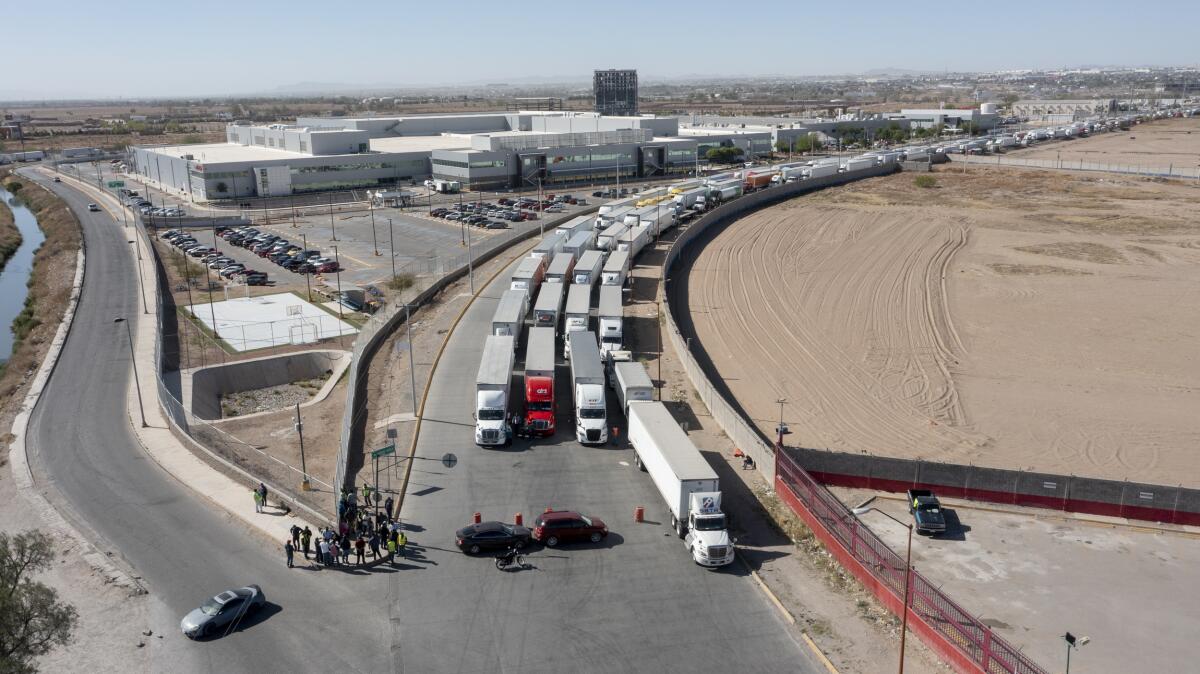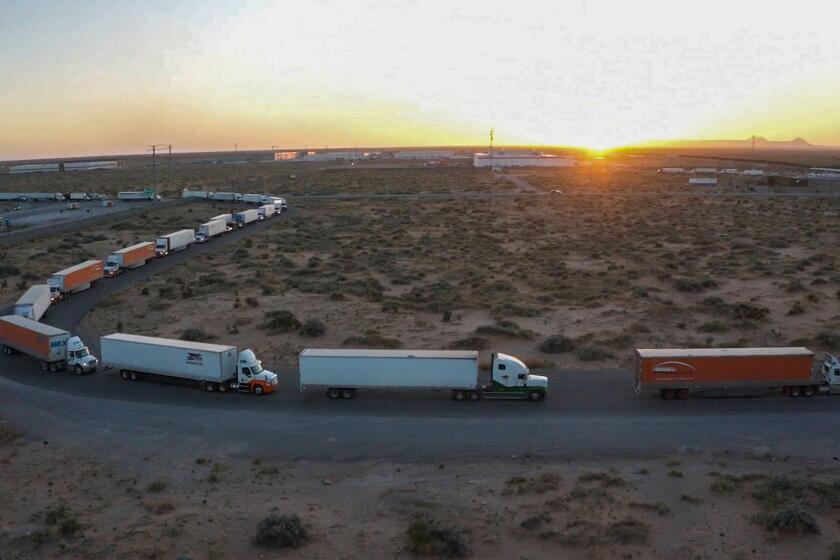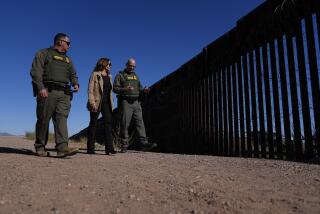EXPLAINER: Why did Texas hold up trucks on border for days?

AUSTIN, Texas — Gov. Greg Abbott’s decision to impose additional inspections of trucks entering Texas from Mexico was his latest move in an unprecedented foray into border security, which has long been the federal government’s domain.
The two-term governor, like many Republican Party leaders, calls illegal immigration and drug smuggling from Mexico a “crisis” and fully blames President Biden. His latest actions follow the Biden administration’s decision to end pandemic-related restrictions on claiming asylum at the border on May 23.
Here are some facts about conditions on the border and Abbott’s response:
Texas Gov. Greg Abbott has repealed his traffic-clogging immigration order that backed up commercial trucks at the U.S.-Mexico border this week.
How many migrants are appearing at the border?
U.S. Customs and Border Protection stopped migrants 164,973 times in February, a daily average of nearly 5,900. March figures will be released soon, but CBP said it stopped migrants an average of 7,101 times a day during the week that ended March 28.
That’s an unusually large number. The last week in March was on pace to establish a new monthly high in Biden’s presidency and one of the busiest ever. The Border Patrol stopped migrants nearly 1.7 million times in the 12-month period that ended Sept. 30 — among the highest since the agency was founded in 1924 — but that number masks a critical difference.
Since March 2020, U.S. authorities have expelled migrants more than 1.7 million times under Title 42 authority, named for a 1944 public health law, using the threat of COVID-19 to deny migrants a chance to seek asylum as required under U.S. law and international treaty. Expulsions carry no legal consequences, encouraging repeat attempts.
In the 2021 budget year, more than 1 of 4 migrants at the border had been stopped “multiple times,” with repeat crossers stopped an average of more than three times in the previous year. Consequently, the number of migrants who crossed the border is much lower than the number of times authorities have stopped migrants.
What has Biden done?
The Democratic president undid many measures introduced by his Republican predecessor, Donald Trump, who belittled asylum as a “scam” and said the country was “full.” The Biden administration reversed a rule that generally prohibited domestic and gang violence as grounds for asylum and ended bilateral agreements to send some migrants to Guatemala, Honduras and El Salvador to seek protection there instead of in the United States.
Biden suspended the “Remain in Mexico” policy on his first day in office after the Trump administration forced about 70,000 asylum seekers to wait in Mexico for hearings in U.S. immigration court. He was forced to reinstate the policy in December under court order, but numbers have been modest. The U.S. Supreme Court will hear arguments April 26 on whether and how Biden can end the policy.
With COVID-19 infection rates dropping, the administration announced April 1 that it will end Title 42 authority on May 23. Some Democratic members of Congress joined Republican leaders to argue the move was premature and the administration unprepared. The Homeland Security Department says it is preparing for as many as 18,000 daily crossings.
On Thursday, 18 states joined Louisiana, Arizona and Missouri in a federal lawsuit to keep Title 42 authority in place. The additional states are: Alabama, Alaska, Arkansas, Florida, Georgia, Idaho, Kansas, Kentucky, Mississippi, Montana, Nebraska, Ohio, Oklahoma, South Carolina, Tennessee, Utah, West Virginia and Wyoming. Texas is conspicuously absent.
What is Texas doing?
Last year, Abbott launched a multibillion-dollar border security mission, deploying thousands of state troopers and National Guard members, installing new border barriers and jailing migrants on trespassing charges. Abbott, who is running for reelection in November, made it the cornerstone of his administration.
Texas, assuming a role like California’s during Trump’s presidency, has been a top legal adversary to changes in immigration policy. It joined Missouri in the case before the Supreme Court on ending “Remain in Mexico.”
After the U.S. Centers for Disease Control and Prevention announced that Title 42 authority was ending, Abbott began inspecting commercial vehicles in addition to CBP’s independent inspections, creating significant delays and backlash from his pro-business allies. He also chartered buses to Washington, D.C., for migrants who volunteered to take them.
On Friday, Abbott fully repealed the inspections after announcing agreements with neighboring Mexican governors about border security, but said he would not hesitate to reimpose them in the future. Migrants are stopped at ports of entry in only about 5% of CBP’s encounters. The vast majority cross in mountains, deserts and cities between official crossings.
The dynamic with drug seizures is different, with fentanyl, heroin, methamphetamine and other hard narcotics being seized overwhelmingly at official crossings instead of between them. Their compact size and lack of odor make them extremely difficult to detect.
Is any of this new under Biden?
No, there have been several spikes in migration since 2014, with a broken asylum system dogging three presidents. The United States became the world’s most popular destination for asylum seekers in 2017.
Immigration experts refer to “push” factors that compel migrants to leave their homes and “pull” factors that refer to policies in destination countries that may influence decisions on where to go.
“Push” factors include hurricanes, violence, political repression and poverty, while “pull” factors include real or perceived changes in U.S. policy. One widely cited “pull” factor is a heavily backlogged U.S. asylum system; it takes an immigration judge four years on average to decide a claim for people who are not in custody.
Last month, the Biden administration unveiled a long-discussed and potentially significant change to expand authority of asylum officers to decide claims, not just initial screenings. It is designed to decide cases in months instead of years, but officials say there are no additional funds for its launch, expected in late May, and to expect a slow start.
Spagat reported from San Diego.
More to Read
Sign up for Essential California
The most important California stories and recommendations in your inbox every morning.
You may occasionally receive promotional content from the Los Angeles Times.











